It’s approaching ten years since NYC Irish rock mainstay Black 47 took their final bow at the now-dark BB King’s Blues Club in November 2014, and what an indelible performance that became. For long-time bassist Joe Burcaw, who earned the nickname “Bearclaw,” life in the time since Black 47 has been a rewarding and fruitful respite from life on the road, going from a touring musician to maintaining has passion for music as a small business owner in Connecticut. Then came 2020 when the pandemic changed the world as we know it especially in discourse of social and political issues and garnered explosions in divisiveness.
But for Burcaw this sparked and inspired the need to speak out through his creative outlet as not only a way to release steam but to also invoke thought. This grew into a new studio project, recently releasing a new EP titled Four On The Floor. It is first-class in its talent, production, and writing, and features a distinctive rock and roll voice. Burcaw took a deep dive into the project with NYS Music, along with his music school Bearclaw’s Academy of Music and of course, some reflections on Black 47.
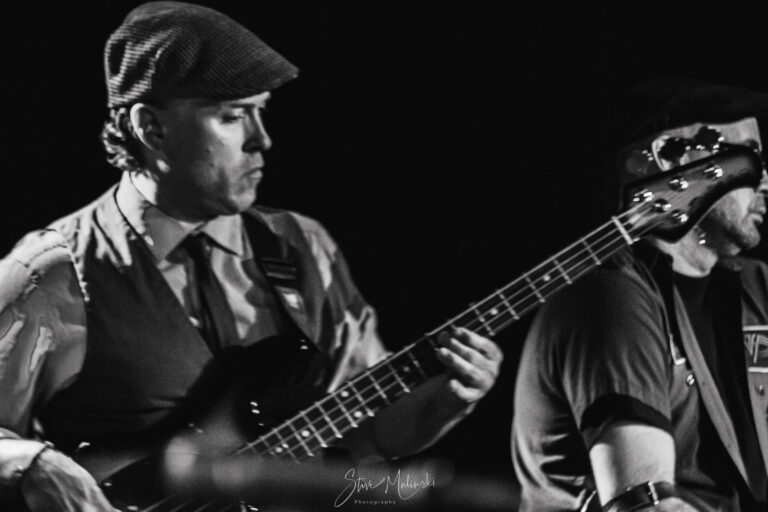
Steve Malinski: Can you tell us how things came to be with Four on the Floor?
Joe Burcaw: The bass player for Living Colour lives up the street from me and I connected with him back in 2017 and took some lessons. I was at a point with my playing where it was it was a bit stagnant and I needed some inspiration. So, Doug’s an incredible inspiration and from Living Colour, one of my favorite bands. So I reached out to his wife actually, who manages him to look into doing some lessons and that led to us working together. He was familiar with Black 47 and he had asked me one session if I would be interested in doing some writing. He produces and writes and I said I would be honored. So we were writing a couple of tunes and were at the point where we need it and felt like it was all instrumental music, very dance oriented, very Euro sounding, with the emphasis on the bass guitars. But we felt like we needed a voice to mix things up a little bit. And he suggested, why don’t I call Corey? I’m thinking to myself in the back of my head, yeah, sure love the world with Corey Glover. So he called Corey, and Corey was totally into it. He came up for a couple sessions and he and I just hit it off. Just had a really nice rapport. And I had said to him at one point and I asked him if he’d be interested in maybe separately doing some songwriting together and he said I would love to. We kept in contact and then came the lockdown. So he and I were always in contact with each other.
Then with the pandemic happening in March of 2020, here we are, everybody’s at home idle, not sure what to do with themselves or their lives, wondering what’s happening with this… this disease. So I thought to myself, first off, I couldn’t get over the amount of discord and the amount of pain that people were going through. And then, you know, I read the New York Times and it made me aware of how there was an uptick in the amount of domestic abuse happening with a lot of women and children who were stuck in situations where they just could not get out and were stuck with their abusive partner. And also with the George Floyd Marches – with him, you know, being killed, the injustices, and the Black Lives Matters uprising. Just like everything was coming to a head and I just felt, I felt the need to call my musician friends and do something about this and get this off my chest – and our chest – and write. So I called up Corey and the mutual friend of ours, Jamie McDonald, and the three of us would have sessions every week bouncing ideas off of each other, lyrical ideas. It was mostly lyrical ideas and just subject matter that we could talk about and put into the lyrics of the songs. And we did that for about two year and a half, two years, and then, you know, it kind of evolved into into this EP. We weren’t sure what we were going to do with it, and then it just kind of evolved naturally into the EP. So that’s a roundabout description of how we got together.
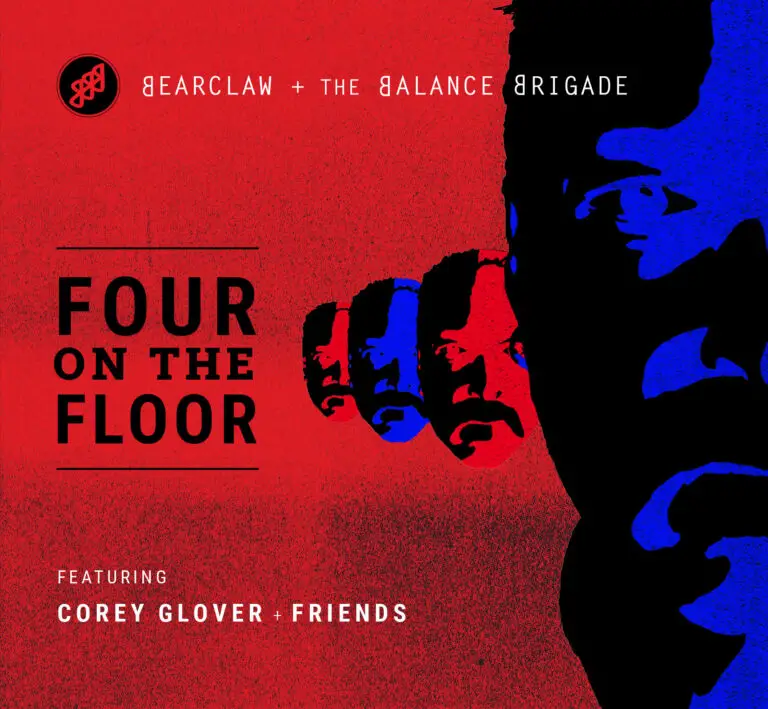
SM: So it kind of started as a way for you guys just to kind of have this release of all the all the stress from basically the world and the pandemic and then it’s like, hey, we got something going, let’s put it on record.
JB: Yeah, that’s basically what happened. And having Corey be so open minded and into the idea of writing with us and recording with us was, to me, it was an honor. I mean, he’s my favorite by far, my favorite vocalist ever. I think he’s very underrated as a vocalist and feel like he needs way more of a spotlight than he gets. He’s a very humble human being and one of those guys where you sit in the room with him and there’s just this ease. He’s just a real gem to be around and I consider him a friend now. So it for me it’s been mind-blowing to be able to call him a friend and a working peer.
SM: So awesome. And yeah, the the first track “Zig Zag” caught my attention with like the really strong bass funk groove. And then Corey’s voice comes in and I’m just like, holy smokes, this is awesome, his voice was so distinctive.
JB: It’s undeniable that when you hear that voice and you know who it is, that’s for darn sure. And with Corey, he doesn’t have that ostentatious way about him, he’s not trying to show off. He is one of those people that has an incredible register. He never goes out of pitch, which is, for me, incredible to watch and he has so much power. I feel like his voice has gotten stronger now than it was back when Vivid came out or Time’s Up or Stain which were popular back 30 plus years ago.
So, getting back on “Zig Zag,” that song talks about having a conversation and avoiding having the conversation. And what I mean by that is that folks in this country need to really step up and be aware that racism is a is a is a problem. Still, it’s been a problem for hundreds of years.
And we’re creating a platform for people to come and talk about this and see about being able to resolve the issues and problems that the black community has been suffering and going through for all these years. Musically, I had written the music for that about a year prior to showing it to the guys. The impetus of the song really came from The Pretenders, who I’m a fan of. I was listening to…what was the song…, “My City Is Gone,” and heard a really great bass line played by Tony Butler from the band Big Country. He did session work on the Learning to Crawl album and just always that bass line just kind of stuck in my head. So I kind of (no pun intended) based the song kind of around that line; the groove is very similar to that Pretenders song and I showed it to the guys and they were really into it.. So that’s the lead single. It’s the song that we just really feel encapsulates what we’re trying to do with this project. It’s a project of community service and trying to get back to the community through our music and for inviting people to listen to it and join us on the ride.
SM: Getting further into the songs, “Mighty Real” – the thing that stuck out to me is the intro, layering all the the voices with dance type feel and then it jumps from a minor key to the major key where you get to the that classic disco feel. What can you say about that song?
JB: Corey and I are big fans of Sylvester, and that’s a remake. Sylvester had a disco tune that came out in maybe ‘79 in the “disco sucks” era, unfortunately. But Sylvester was a drag performer. He was part of a troupe called The Cockettes. They’re based out of San Francisco and they would travel from coast to coast to New York and San Francisco and other areas around the country. And that was his biggest hit. It was such a great dance track and I just remember when I was a kid hearing it, just loving it, because of the bass and the drums, the interplay between the rhythm section… it just really it really floored me as a kid. When I learned that Corey was into it as well we just discussed, why don’t we do a more modern version of the song and kind of make it our own? And add a guitar solo because on the original track there’s some rhythm guitar but there’s no solo whatsoever on that. I envisioned having this really big thought-out masterpiece outro solo. I had Vernon Reed and Missus Smith in mind. I reached out to Missus Smith first and she was totally into the idea of it.
I love, the idea of having this dance form, dance floor feel and then having this rippin’ guitar solo that lasts for 60+seconds. Just bombastic shredding. I think it really it makes the listeners kind of tilt their head going whoa, wasn’t expecting this! because it starts out really dancey and then it as it continues to the bridge section it gets harder and harder with the guitars being more upfront in the mix. We did that intentionally to have a build-up crescendo towards the end. So that song is the second single.
“Ode to Ustad”: Ustad Sultan Khan was a classical Indian musician and I first got turned on to him through Warren Cuccurullo who’s the guitar player used to play with Frank Zappa, Missing Persons, and Duran Duran. I’m a big fan of his playing and he put a record out with this gentleman, titled The Master. And it was all Indian-fused music with a lot of drones and a lot of chanting in it and just I’ve always loved the music and it just really struck a chord with me and was one of those instances where I was thinking to myself, wow, I know this guy really has influenced me and I haven’t really paid homage to that and I wanted to do so. So that’s why II titled it “Ode to Ustad.” And I wanted to have the music be more focused on Indian ragas and Indian drones and it’s all me playing it on the bass. I played six string synth bass and four string bass on that particular track.
There’s also an ongoing theme of all four songs on the EP. The reason it’s called Four on the Floor is because all the songs are 110 beats per minute or higher. So it’s kind of got that dance, you know, four on the floor kind of kind of feel.
SM: Lastly, “House Arrest” seems to link directly to the pandemic times. What kind of message are you getting to in this song?
JB: Well, it’s strictly about domestic abuse. It’s coming down on, as I said at the top of the conversation, coming down on people who are abusive to their partners and their children and also shedding light that there is hope. And there if somebody needs to get out of a situation you do it. And I know that’s easier said than done. But I’m hoping that people can listen to the track and get some inspiration and maybe make a choice that they weren’t thinking about making before listening to it, to get out of a situation that’s tumultuous, dangerous, something that that could harm the person or their family. I specifically got that idea from a New York Times article that I read. It was probably May of 2020 about when the uptick in abuse since COVID happened and people were blocking down together. That was a reaction to that. I had the first stanza down and then I showed it to the guys and we collaborated on finishing the rest of the lyrics. So, a lot of lyrics on that.
It’s a lengthy one but we just felt like we needed to have all of those words in there to get the point across. We’re happy with the way that came out, that the song has a (as far as the bass line is concerned) more of a chic-meets-Duran Duran kind of feel to it. I wrote it specifically for Corey’s voice, for a lot of the inflections that he adds to music and wanted to not get in the way of the vocal line and create a lot of space for it, especially during the verse sections where he could ad-lib a little more and not have me get in the way of the music.
SM: So who how did the virtual/remote production process go given all the moving parts?
JB: What happened was, as far as the tracking I have a DAW set up at home, I have Logic [production software] and then Corey had Garage Band And our mutual friend Jamie has Pro Tools. So, we were sending files and I was just recording my bass at home and sending it over. Jamie was doing a lot of tweaks. He’s really good with engineering. Then I had another person come in and do some mixing as well to help out with that. And then as far as you know, then I sent it to Disk Makers for mastering, had that mastered and then here we are. So yeah, everything was done on our own.
It was a real DIY instance since we weren’t able to go into the traditional studio to record and track. It was… it was different. I mean it proved to me that it’s possible to make a decent sounding record from home. Would I do it again? I don’t know. I like the idea of getting into a room and bashing out parts with other musicians there to kind of vibe off of each other. So that’s kind of more my preference as opposed to virtually recording.
SM: Yeah, I suppose it’s different if you’re just recording a backing track that somebody else wrote for you but when you’re putting your heart and soul into it, definitely the whole face to face thing is priceless.
JB: It is, yeah. We’re human beings and that’s how you work off each other. You feel what’s coming from the other human, whether that’s good or bad. With us it was great. So, I would love for us to get into the studio and do some more. There’s talk of us doing some more. I think going forward we’d like to make more in the way of singles as opposed to a full length album or EP. It’s just easier by doing it that way. We got lucky just because of lockdown that everybody was around that we were able to do that [full EP]. But now that things have opened up a bit more, I don’t know, Corey’s out on the road a bunch with Living Colour right now.
They’re playing with Extreme and had a success with that. So he’s not home much, but I did talk to him right before he left for his tour and we’re going to get back together once he gets home and work on some more ideas.
SM: I was going to ask if you guys were going to get together again and record, but do you think you might also schedules a line up to maybe do a short live show somewhere.
JB: Yeah, we’re we’re in talk talks of doing that right now [later in 2024]*. I own the music school [Bearclaw’s Academy of Music] and we’re looking to do a fundraiser for kids who can’t afford instruments or lessons, and we want to raise some money for kids that are under-privileged and not able to do so. So it would be maybe a half hour set if if that. It’s not going to be a real long thing because you know again it’s going to be during the afternoon, it’s not going to be at night. But yeah, we’re talking about that if Corey will be around.
So I think we’ll be able to do that with this project. It’s not a touring entity. It’s a studio project built around community service and giving back and writing about topical situations that not everybody talks about, ones that sometimes get thrown under the rug, like with the racism, with gay rights, with immigration oppression, domestic violence. So the idea of doing what I did with Black 47, hitting the road consistently… I just don’t think that would be feasible at this point. But one-offs, definitely. We’ll definitely do one-offs here and there.
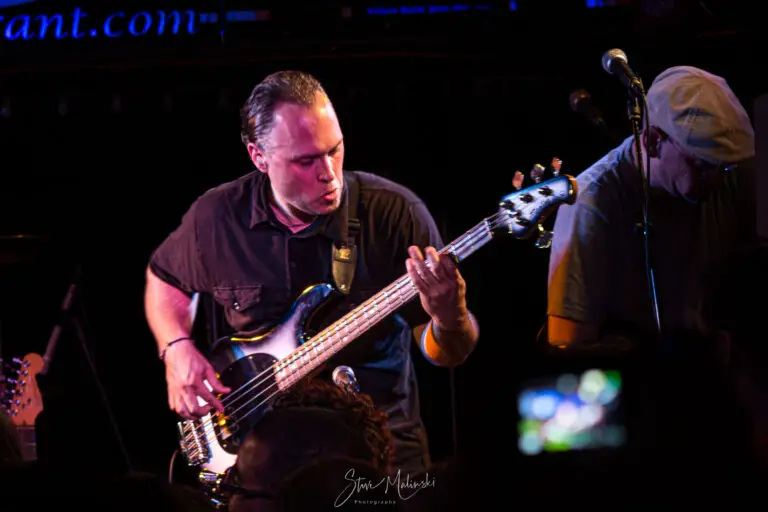
SM: So to shift gears a little bit, how are things with your music school? You’ve been running the school for 8 or 9 years now?
JB: Yeah, yeah, it’ll be 8 years. Oh, it’s great. I love it. I really enjoy being able to be a small business owner and to teach and to kind of run the show on my own. I mean, it’s a lot of arduous work. I’m a one-man operation so I have to do everything as far as coordinating all the scheduling of my teachers and financial things as far as taking care of payroll and all that. So it’s a lot on top of teaching since I have a lot of a lot of students that I teach bass guitar and ukulele too. It’s very satisfying. I love that I can wake up and know that I don’t have to go into a nine-to-five because I’ve done that in the past and this way don’t have to listen to anybody barking orders at me. My wife is a small business owner too, she’s a music therapist so she’s taught me a lot as far as just how to run a business properly and has given me a lot of advice and assistance with that end of things.
So it’s going great. But again, it was difficult during the COVID days of 2020 and even for the last two, two and a half years it’s been kind of a rebuilding because back then virtually everybody, I mean the world, shut down and thank goodness for virtual teaching and for virtual lessons. I was able to continue doing that and it kept my business afloat while we were not able to get into the building. I look forward to branching out and to expanding and to get back to where we were right before COVID, we were doing really well with a lot of lot of students coming in. Now we’re about 75% and we’re picking up. But again, you have to keep in consideration so many people lost their jobs, so many people moved out of the area.
You know, there’s so many circumstances and variables that that affect people not coming back.
SM: Yeah, different folks re-prioritizing things…
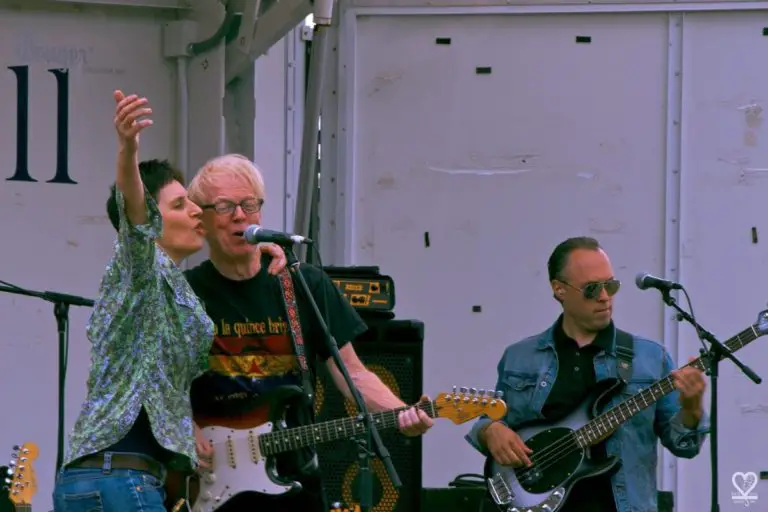
JB: Yeah it’s true. I’ve been really, really happy with that. It’s my new life. You know, I had an old life as a touring musician with Black 47, and now I’m small business owner. Like what? Really. I mean, I do still perform. I have a Jimi Hendrix tribute band that I play in with some buddies of mine from Boston and we play out every once in a while with that, which is nice. So it keeps me in the game a little bit as far as live performance is concerned because I really don’t get to play live that much. I have a three-year old as well, so I’m a relatively newer dad.
SM: Oh, Congrats!
JB: Thank you. Thank you. Yeah. So got a lot on my plate, that’s for sure.
SM: So do you work with both kids and adults?
JB: We do. I mean primarily kids, but we do have some older adults that are more retired age come in for lessons. I mean we’re “everybody’s welcomed with open arms” but we just find that most it’s mostly kids that do come in for the for the lessons. I do have a couple of students that I teach virtually as well that are overseas that are adults Amsterdam, UK and it’s great. I love being able to do that. It’s so convenient that you can walk down into your studio in your house, get hard wired in, get on Wi-Fi, and boom. You know, it’s fantastic to be able to communicate with somebody that’s thousands of miles away on the other side of the planet.
SM: I’ve had experience taking some group drumming lessons with a teacher in Scotland, so it’s like 5:00 PM there and we’re just having our coffee over here while we’re all in different locations. Definitely it works, but not preferred, I’ll say that.
JB: Yeah, I have to say with at least for me with bass guitar and teaching guitar it’s fine. I can understand for some instruments like drums it might be a little difficult. I mean you can do it. Obviously piano is a little more difficult because of the hand situation where you have to get the camera where it’s looking down on the kids’ hands to see if their positioning is correct and also being able to look at the person and being able to dictate what you want them to do. So it is hard with the with the piano, but I found I’ve had no problem. The only problem I ran into is there’s a bit of latency, so using a metronome is a little dicey. So, I wouldn’t recommend that until we get more software that’s more reliable. But aside from that, I love it. I really enjoy doing that.
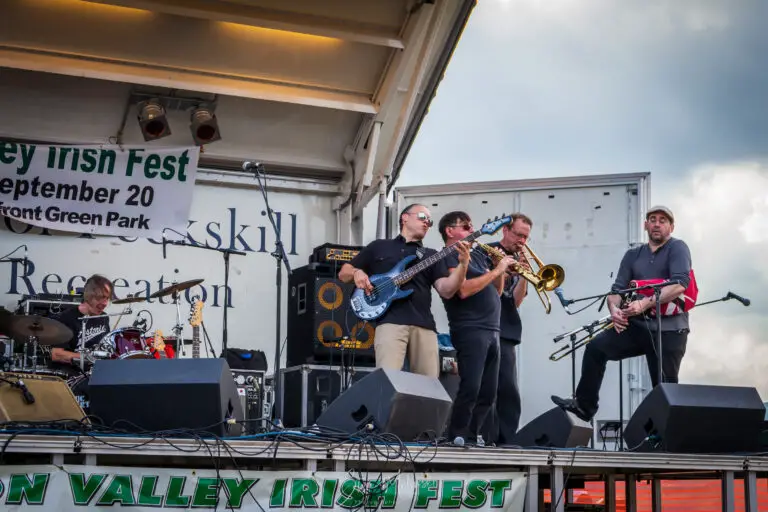
SM: Before we wrap up… Black 47, obviously that’s been a big part of your life. I see the six albums hanging up there on your wall.
JB: Yes, there they are.
SM: So you recorded six with them?
JB: I did. I did 3 studio and then one of them is the DVD Live at Connolly’s and then the other two are compilation records. So there were three I recorded on – Iraq, Bankers and Gangsters, and Last Call, as far as the studio albums are concerned.
SM: Yikes, it’s been 9, going on 10 years this coming November since Black 47 wrapped up. Having this much time since then, what does the experience feel like now versus, say, like the day after that last show at BB King’s in NYC?
JB: I don’t even feel like it was the same person. I don’t even know who that guy was. My, life has changed so drastically since that last night at BB King’s, just, you know, I got divorced. I got remarried. I had a kid. Both my parents passed away and I opened up my own business. You know, within 10 years all of this stuff happened. So it was very surreal to say the say the least. But I wasn’t despondent, you know, there wasn’t any type of despondency.. But it was a lot, you know, it’s a lot to take in. I mean first off, when you’re in a band and play with the band for just under a decade, these guys were my family. That’s the thing with Black 47 people need to understand as well, is that these guys took me under their wing, accepted me. I was never… I mean the joke was I was always the new guy, Bearclaw, the new guy. But I was never treated that way. And I always felt like I was there from day one, even though I was too young to be a part of the band. Back then, you know, when they started out, I was still a teenager. So that wouldn’t have worked out. But every night that I got on stage with those guys… I never took it for granted. I would look around at these five musicians and just thank, thank whoever the source for putting me there with them because I love the band. I was a fan before I got to play with them. Well, I first got turned on to them on 120 Minutes on MTV and saw them do “40 Shades of Blue” as one of the lead tracks that they were pushing on top of “Funky Ceili.” And I just thought to myself, wow, this is very interesting having the uilleann pipes mixed in with the Irish theme on top of having the sophistication of songwriting like Bruce Springsteen mixed in with The Clash. So then I got to see him at TT the Bears Place in Cambridge, MA when I was up in college in Rhode Island. I was just floored. My jaw hit the hit the ground just in awe at the musicianship and just the power that they exuded. That really struck me, the power of that band. And then almost 10 years later, I’m pinching myself. I’m standing on stage with him.
SM: And that was just a lucky chance, too, right? I recall you mentioned last time we spoke that it was an ambiguous newspaper ad?
JB: Advert, yeah. And at that point I was in New York City, just banging the pavement, playing with everybody and answering all these different various adverts. And there happened to be “one touring band looking for a bass player ASAP. Please submit.” So I sent my EPK and didn’t hear from them until, I don’t know. Hammy [drummer] called me a week later, using a pseudonym. He didn’t even lead on to who he was until a couple phone calls later and he got a good feel for me. And then yeah, he invited me. He just asked if I was playing out. I happened to be playing out with a band on a particular weekend that he was available and he came down to the show. I didn’t think he showed up because he didn’t introduce himself.
So I finished performing with this band and nobody was there. But I come to find out that there was a torrential downpour during this gig and he got soaked and wanted to go home before the end. But he did get to see me and was really impressed and asked me to come down for an audition. And yeah, he left me a voicemail and asked if I’d be interested in coming down. And yeah, the rest is history. So awesome. They put me on retainer for about a month after my audition then for 8 to 10 shows to see how it goes. And then after New Year’s, I think going into 2006, they asked me to become a full, full time member. The rest is history.
*Editors’ note: the potential date of the fundraiser event changed since the time of the interview from spring 2024 to fall 2024.


Comments are closed.